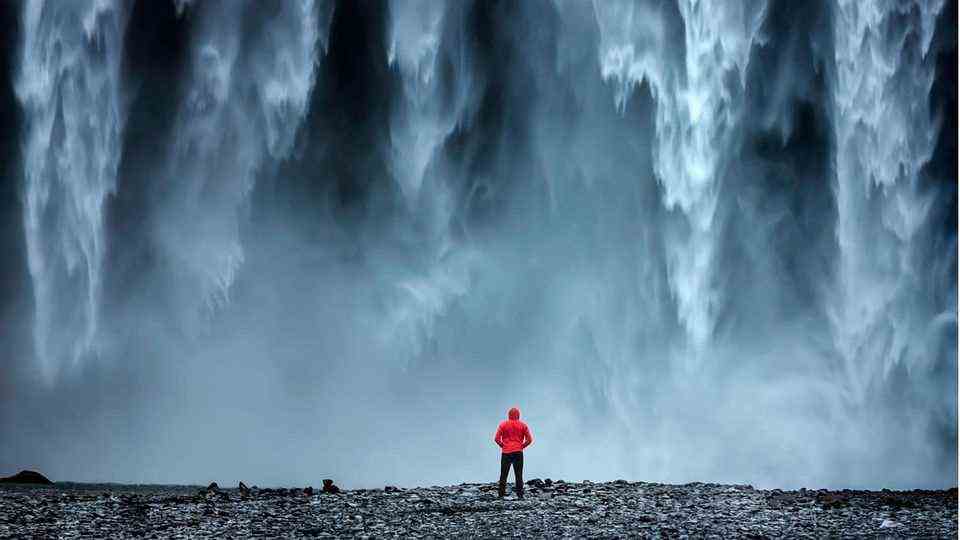Climate change is not solely to blame for the water shortage, says Martin Keulertz, lecturer in water management and food security at the American University in Beirut. In order to save water, not only do people in arid areas have to rethink – we too.
Mr Keulertz, Ethiopia’s mega-dam, the Grand Ethiopian Renaissance Dam, is causing conflicts with neighboring countries. Egypt even threatened subliminally with the use of its military. Will we soon experience wars over water, as Boutros Boutros Ghali predicted in the 1980s?
From a scientific perspective, the water war theory is not tenable. In reality, it has not yet proven to be true worldwide. Because water is also a resource that states can easily negotiate with one another. This also happens in the Nile basin, for example. It is different with local conflicts. Tensions between ethnic groups or religious groups, which may have been fermenting for years, are exacerbated by the lack of water.
So the martial words of Egypt are primarily a domestically motivated reaction to the building in the neighboring country?

Martin Keulertz, lecturer at the American University in Beirut
© private
War rhetoric began in Egypt as early as the late 1970s and was then taken up in many ways. The Ethiopian dam is now attracting a lot of attention, but was planned back in the 1980s. It will take another five to seven years until it is filled. In the meantime, Egypt may get less water. However, the Egyptians have been overexploiting their share of the Nile, which was attributed to them through the colonial treaties, for decades, while the other neighboring states have never fully claimed their share. That has changed because the population in the countries is growing rapidly and the various interests now have to be negotiated with one another. The crucial question is how these people are fed, because the Nile is the only water catchment area that you have there.
What options are there to better distribute the water?
In Egypt there is hardly any precipitation and the groundwater is fossil, so it is finite. The water that you have must therefore be used wisely and must not seep away into agriculture as it has been up to now. The problem is not the smallholders, but the agricultural exporters, who consume the majority. This water shortage is partly homemade. Corruption and political influence play a significant role in this sector. But also the demand. You have to bear in mind that an arid country like Egypt produces grapes for our supermarkets. It’s not sustainable.
We produce enough food in the world
But profitable?
Europe is in the process of taking a closer look at its supply chains. In this context, water consumption is definitely an aspect that deserves more attention.
That means, if the overuse by the agricultural industry were to disappear, would a country like Egypt get along quite well despite climate change and drought?
Water-insecure countries can be stabilized with various measures. First: a reduced agriculture adapted to climatic conditions. A plant like wheat, for example, is completely unsuitable for the region. Domestic cereals such as sorghum, lentils and other legumes protect the soil and save water. In addition, investments in water-saving agricultural innovations such as plant-based meat imitations, hydroponics, but also better pasture management are required. Second: strategic food import. In the world as a whole, we actually produce enough food to supply regions like the Middle East with products that they should not produce themselves due to the high water consumption. The Egyptians know this too, they have been importing wheat since the 1960s. Formerly from the USA. Today from Russia. Thanks to its rich resources, the supply will also be possible in the future without any problems; therefore, Russia is becoming increasingly important for food security in the Middle East. Third: In the long term, countries have to diversify their economies – away from agriculture and towards greater industrialization. Many things that we get from China today could also be produced in the Middle East. So if we want to keep the water crisis from worsening, we should help countries build strong education systems. Ultimately, that would also be an opportunity for Europe when it comes to regaining importance in the region alongside China and Russia.
A hydrocide threatens Iraq
There have been no interstate wars over water so far – but in July there were again bloody protests in Iran due to water scarcity and drought; In Syria and Iraq, the people experienced the worst drought in decades, and for months the residents had hardly any access to drinking water. Isn’t it a matter of time before it escalates?
The situation on the Euphrates and Tigris basins is dramatic and is exacerbated by rising temperatures and extreme drought. Basra, south of the Iraqi capital Baghdad, has been hardest hit for years. The city is literally drying out, it is littering, the supply is collapsing – a hydrocide is looming in Iraq, and it cannot be ruled out that we will experience something similar in Iran.
Can something be done about the increasing drought there, or is it, to a certain extent, geographical bad luck?
The bad luck is, if you will, that the water shortage there is only one link in a chain of crises and conflicts. Climate change certainly acts as an amplifier, but it does not go far enough to attribute the water shortage to it. The Iraq war was also an ecological disaster; today Iraq is a failed state with a weak government and a poor population. In addition, the water supply in drought-ridden countries is always political. This leads to short-term actions, for example when rivers are dammed or diverted to supply a city, with the result that water is lacking in the long term.
The Euphrates and Tigris have their source in Turkey – and are dammed there in the south, so that less and less water arrives in Iraq and Syria. Is this accusation true?
In any case, satellite images show that there is hardly any agricultural production on the Syrian side, everything takes place on the Turkish side.

Are there no rules that forbid a country from draining its neighboring states?
We have international water law, but a water treaty has been initiated repeatedly since the 1960s, but has never been concluded. But Realpolitik follows its own rules. Yes, Turkey is taking water from its neighbors. But if you criticize that, you have to ask yourself: Who will benefit from it? For Europe, for Germany, Turkey has become a fantastic supplier of textiles. The high water consumption in the region is therefore also the responsibility of the European corporations that produce there. It is not just the population in arid areas that has to change their demand – so do we.



